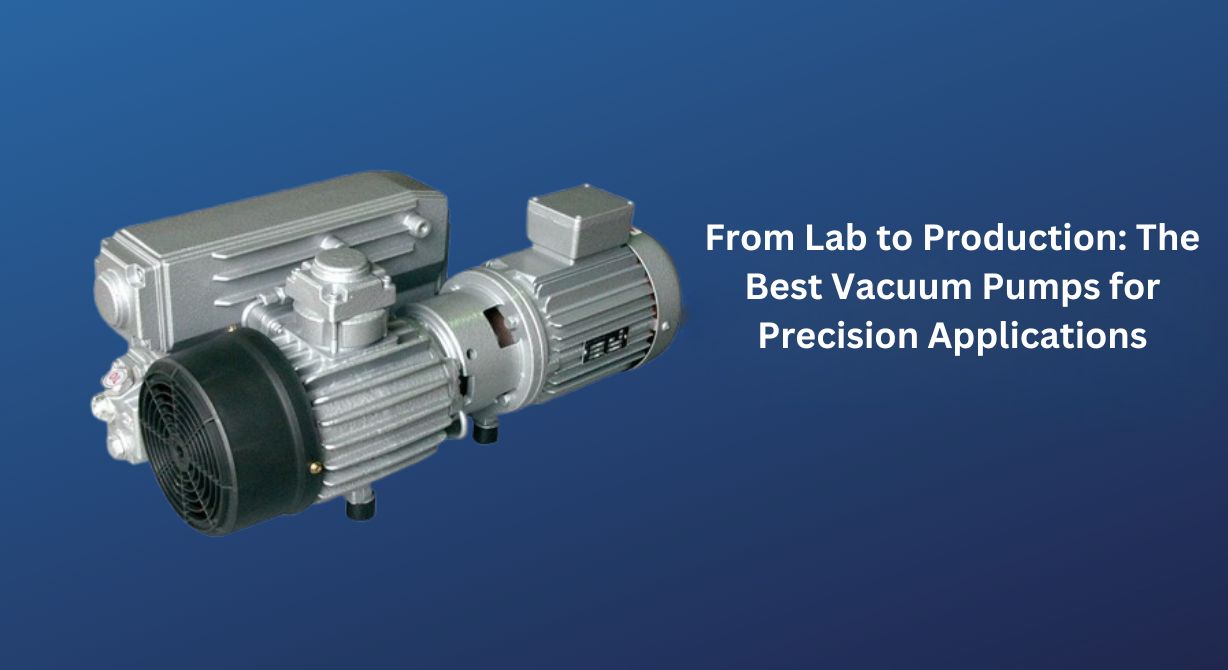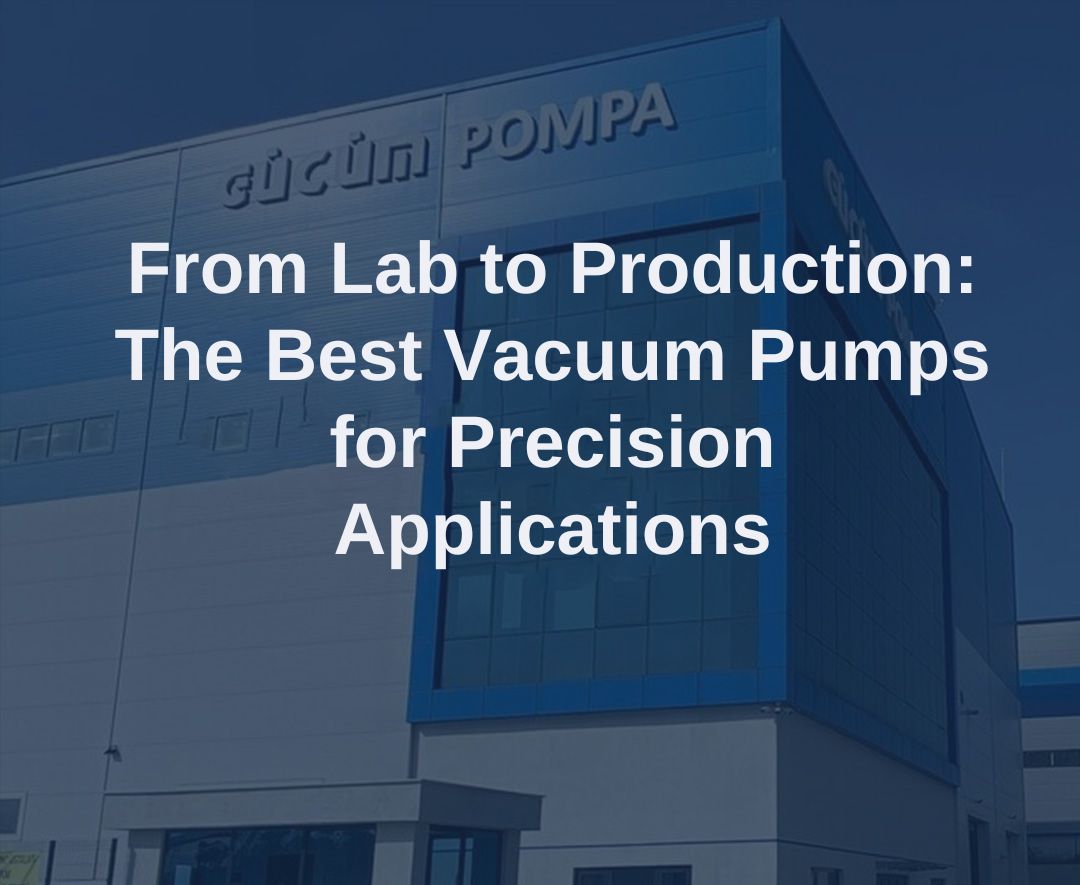From Lab to Production: The Best Vacuum Pumps for Precision Applications
Table of Contents
- Which Vacuum Pump is Most Suitable for Laboratory and Production?
- What to Consider When Choosing a Vacuum Pump for Precision Applications?
- From Laboratory to Production: A Guide to Selecting Precision Vacuum Pumps
- Preferred Vacuum Pumps in Laboratory and Industrial Production
- Laboratory vs. Industrial Vacuum Pumps: Which One is More Suitable for You?
- Comparison of Piston and Rotary Vacuum Pumps for Precision Applications
Which Vacuum Pump is Most Suitable for Laboratory and Production?
Laboratory and production environments require different vacuum pump needs. In laboratory applications, precision and low vibration are prioritized, whereas in production facilities, high capacity and durability play a more critical role. Therefore, when choosing the most suitable vacuum pump, technical specifications should be considered based on the usage area.
Laboratories typically prefer rotary vane or piston vacuum pumps. These models offer low noise levels, minimal vibration, and precise control. Factors such as chemical resistance and a clean operating environment are also priorities for laboratory pumps. For precision applications, the pump’s oil-free operation feature is also an important criterion because contamination risk must be minimized.
In production facilities, high flow rate and durable vacuum pumps are more commonly preferred. These pumps need to withstand long operating hours and be easy to maintain. Additionally, energy efficiency and remote monitoring features provide advantages in cost and operational management in industrial settings.
Also, pump capacity, vacuum level, and operating environment conditions should be taken into account in the selection. There are versatile models that can meet the needs of both laboratory and production environments, but for optimal performance, selecting a pump suitable for the specific application is essential.
What to Consider When Choosing a Vacuum Pump for Precision Applications?
Choosing a vacuum pump for precision applications is a serious matter because the wrong choice can negatively affect both product quality and process reliability. First, it is necessary to correctly determine the vacuum level required. Too low or too high vacuum can cause unexpected problems in your application. Therefore, you should focus on the appropriate pump capacity and performance values for your usage area.
Another critical factor is quiet operation and vibration level. Precision processes generally yield more stable results with low-vibration and quiet vacuum pumps. Additionally, oil-free or dry operation features are important, especially in laboratory and medical applications where contamination risk is high.
Energy efficiency should not be overlooked; in systems running for long periods, low-energy consumption vacuum pumps reduce operating costs and provide an environmentally friendly approach. Also, ease of maintenance and long service life should be decisive in the selection. Easy maintenance reduces operational downtime, while durable materials extend the pump’s lifespan.
Finally, pump control systems and remote monitoring features facilitate performance tracking in precision applications, preventing errors and contributing to process optimization.
From Laboratory to Production: A Guide to Selecting Precision Vacuum Pumps
Transitioning from laboratory to production, vacuum pump selection emerges as a critical step. Laboratory environments are usually designed for sensitive and low-volume applications, whereas production processes require higher capacities and continuous operation. Therefore, determining the appropriate pump type and technical specifications is of great importance.
In laboratories, the most preferred pumps are rotary vane or oil-free dry pumps. These models stand out with low vibration, quiet operation, and minimal contamination risk. For the production phase, high-efficiency and durable piston or screw vacuum pumps are more suitable. Durability for continuous operation and easy maintenance are priorities in industrial selections.
When choosing, vacuum level, pump capacity, and application requirements should be well analyzed. Moreover, energy-saving and remote monitoring models reduce operating costs and facilitate process control. A balanced evaluation of these critical parameters during the transition from laboratory to production ensures efficient and uninterrupted operation in the long term.
Preferred Vacuum Pumps in Laboratory and Industrial Production
Laboratory and industrial production processes differ significantly in terms of key factors determining vacuum pump preference. Laboratory applications typically focus on precision, low vibration, and minimizing contamination risk, whereas industrial production demands higher capacity, durability, and continuous operation.
The most commonly used models in laboratories include rotary vane vacuum pumps and oil-free dry vacuum pumps. These pumps offer low noise levels, precise control, and chemical resistance advantages. Also, oil-free operation features are indispensable for sensitive and clean working environments. Pump selection in laboratory applications requires detailed analysis based on the materials used and the characteristics of the environment.
On the other hand, in industrial production, piston and screw vacuum pumps are generally preferred. These models meet industrial demands with high flow rate, durability, and long service life. Factors such as energy efficiency and ease of maintenance are also reasons for their preference. Technological innovations like remote monitoring and automatic control systems play an important role in process optimization in industrial pumps.
In conclusion, the main differences between laboratory and industrial vacuum pumps depend on usage purpose and operational requirements. Correct pump selection is critical in terms of both performance and cost, and application-specific needs should be carefully evaluated in both fields.
Laboratory vs. Industrial Vacuum Pumps: Which One is More Suitable for You?
Vacuum pumps used in laboratory and industrial fields are designed according to different needs, making it critical to determine which one suits you better. Laboratory vacuum pumps stand out with features such as precision, low noise levels, and minimal vibration. This pump type is mostly used in chemistry, biology, and medical applications and models with oil-free or dry operation principles are preferred. This reduces contamination risk and ensures precise experimental conditions.
Industrial vacuum pumps are generally selected with priority on high capacity, durability, and energy efficiency. Piston and screw vacuum pumps are frequently used in industry because they offer high performance and ease of maintenance during long operating periods. Additionally, these pumps, supported by technologies such as remote monitoring and automatic control systems, allow optimization of production processes.
When choosing, criteria such as application area, vacuum level, and pump capacity should be considered. Low noise, precise control, and clean working environment are important for laboratory use, while durability and energy saving are prioritized in industrial areas. Ultimately, the vacuum pump that best fits your needs should be selected according to your working conditions and performance expectations.

Comparison of Piston and Rotary Vacuum Pumps for Precision Applications
When choosing a vacuum pump for precision applications, many criteria must be considered between piston vacuum pumps and rotary vacuum pumps. Piston pumps stand out with high vacuum level and strong suction power. These pumps are preferred especially in heavy-duty conditions and applications requiring high pressure difference. However, due to their mechanical structure, vibration and noise levels are higher compared to rotary models.
Rotary vacuum pumps are generally quieter and operate with lower vibration, making them more suitable for sensitive environments. Rotary vane or rotary lobe models, available in oily or oil-free options, minimize contamination risk in precision applications. Additionally, their ease of maintenance and compact design make them ideal for laboratory and light industrial processes.
In terms of energy consumption, rotary pumps generally operate more energy-efficiently. Piston pumps may increase operating costs as they require more power. However, the long lifespan and durable structure of piston pumps provide advantages in heavy industrial applications.
In conclusion, piston vacuum pumps are preferred in precision applications demanding high performance and durability, while rotary vacuum pumps stand out in environments requiring low noise, low maintenance, and energy savings. When choosing, the application requirements and working conditions should be considered.


